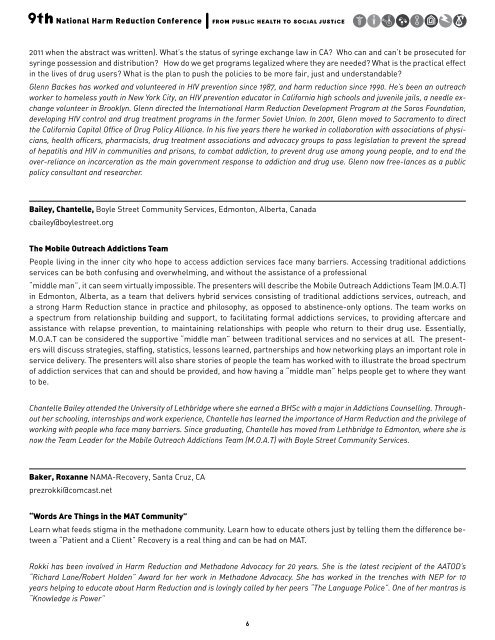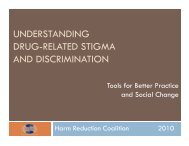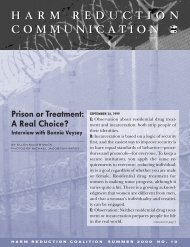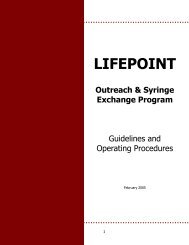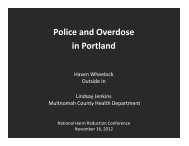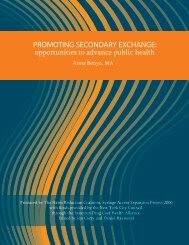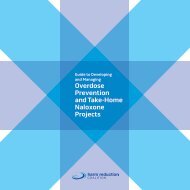9th - Harm Reduction Coalition
9th - Harm Reduction Coalition
9th - Harm Reduction Coalition
Create successful ePaper yourself
Turn your PDF publications into a flip-book with our unique Google optimized e-Paper software.
<strong>9th</strong><br />
National <strong>Harm</strong> <strong>Reduction</strong> Conference<br />
FROM PUBLIC HEALTH TO SOCIAL JUSTICE<br />
2011 when the abstract was written). What’s the status of syringe exchange law in CA Who can and can’t be prosecuted for<br />
syringe possession and distribution How do we get programs legalized where they are needed What is the practical effect<br />
in the lives of drug users What is the plan to push the policies to be more fair, just and understandable<br />
Glenn Backes has worked and volunteered in HIV prevention since 1987, and harm reduction since 1990. He’s been an outreach<br />
worker to homeless youth in New York City, an HIV prevention educator in California high schools and juvenile jails, a needle exchange<br />
volunteer in Brooklyn. Glenn directed the International <strong>Harm</strong> <strong>Reduction</strong> Development Program at the Soros Foundation,<br />
developing HIV control and drug treatment programs in the former Soviet Union. In 2001, Glenn moved to Sacramento to direct<br />
the California Capital Office of Drug Policy Alliance. In his five years there he worked in collaboration with associations of physicians,<br />
health officers, pharmacists, drug treatment associations and advocacy groups to pass legislation to prevent the spread<br />
of hepatitis and HIV in communities and prisons, to combat addiction, to prevent drug use among young people, and to end the<br />
over-reliance on incarceration as the main government response to addiction and drug use. Glenn now free-lances as a public<br />
policy consultant and researcher.<br />
Bailey, Chantelle, Boyle Street Community Services, Edmonton, Alberta, Canada<br />
cbailey@boylestreet.org<br />
The Mobile Outreach Addictions Team<br />
People living in the inner city who hope to access addiction services face many barriers. Accessing traditional addictions<br />
services can be both confusing and overwhelming, and without the assistance of a professional<br />
“middle man”, it can seem virtually impossible. The presenters will describe the Mobile Outreach Addictions Team (M.O.A.T)<br />
in Edmonton, Alberta, as a team that delivers hybrid services consisting of traditional addictions services, outreach, and<br />
a strong <strong>Harm</strong> <strong>Reduction</strong> stance in practice and philosophy, as opposed to abstinence-only options. The team works on<br />
a spectrum from relationship building and support, to facilitating formal addictions services, to providing aftercare and<br />
assistance with relapse prevention, to maintaining relationships with people who return to their drug use. Essentially,<br />
M.O.A.T can be considered the supportive “middle man” between traditional services and no services at all. The presenters<br />
will discuss strategies, staffing, statistics, lessons learned, partnerships and how networking plays an important role in<br />
service delivery. The presenters will also share stories of people the team has worked with to illustrate the broad spectrum<br />
of addiction services that can and should be provided, and how having a “middle man” helps people get to where they want<br />
to be.<br />
Chantelle Bailey attended the University of Lethbridge where she earned a BHSc with a major in Addictions Counselling. Throughout<br />
her schooling, internships and work experience, Chantelle has learned the importance of <strong>Harm</strong> <strong>Reduction</strong> and the privilege of<br />
working with people who face many barriers. Since graduating, Chantelle has moved from Lethbridge to Edmonton, where she is<br />
now the Team Leader for the Mobile Outreach Addictions Team (M.O.A.T) with Boyle Street Community Services.<br />
Baker, Roxanne NAMA-Recovery, Santa Cruz, CA<br />
prezrokki@comcast.net<br />
“Words Are Things in the MAT Community”<br />
Learn what feeds stigma in the methadone community. Learn how to educate others just by telling them the difference between<br />
a “Patient and a Client” Recovery is a real thing and can be had on MAT.<br />
Rokki has been involved in <strong>Harm</strong> <strong>Reduction</strong> and Methadone Advocacy for 20 years. She is the latest recipient of the AATOD’s<br />
“Richard Lane/Robert Holden” Award for her work in Methadone Advocacy. She has worked in the trenches with NEP for 10<br />
years helping to educate about <strong>Harm</strong> <strong>Reduction</strong> and is lovingly called by her peers “The Language Police”. One of her mantras is<br />
“Knowledge is Power”<br />
6


